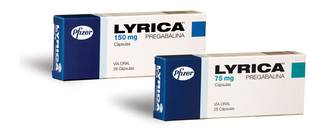
If you have diabetes and shooting burning pins and needles pain in your feet or hands, ask your doctor about LYRICA (pregabalin).
For some patients, LYRICA can provide significant relief from diabetic nerve pain.
Prescription LYRICA is not for everyone. Tell your doctor right away about any serious allergic reaction that causes swelling of the face, mouth, lips, gums, tongue, throat, or neck or any trouble breathing, rash, hives or blisters. LYRICA may cause suicidal thoughts or actions in a very small number of people. Patients, family members or caregivers should call the doctor right away if they notice suicidal thoughts or actions, do not stop LYRICA without first talking to your doctor. LYRICA may cause swelling of your hands, legs and feet. Some of the most common side effects of LYRICA are dizziness and sleepiness. Do not drive or work with machines until you know how LYRICA affects you. Other common side effects are blurry vision, weight gain, trouble concentrating, dry mouth, and feeling “high.” Also, tell your doctor right away about muscle pain along with feeling sick and feverish, or any changes in your eyesight including blurry vision or any skin sores if you have diabetes. You may have a higher chance of swelling, hives or gaining weight if you are also taking certain diabetes or high blood pressure medicines. Do not drink alcohol while taking LYRICA. You may have more dizziness and sleepiness if you take LYRICA with alcohol, narcotic pain medicines, or medicines for anxiety. If you have had a drug or alcohol problem, you may be more likely to misuse LYRICA. Tell your doctor if you are planning to father a child, if you are pregnant, or plan to become pregnant. Breastfeeding is not recommended while taking LYRICA. Talk with your doctor before you stop talking LYRICA or any other prescription medication.
ABOUT LYRICA
LYRICA is a prescription medicine used in adults 18 years and older to treat:
- Pain from damaged nerves that happens with diabetes or that follows healing of shingles, or spinal cord injury
- Partial seizures when taken together with other seizure medicines
- Fibromyalgia (pain all over your body)
Who should NOT take LYRICA:
- Anyone who is allergic to anything in LYRICA
BEFORE STARTING LYRICA
Tell your doctor about all your medical conditions, including if you:
- Have had depression, mood problems or suicidal thoughts or behaviour
- Have or had kidney problems or dialysis
- Have heart problems, including heart failure
- Have a bleeding problem or a low blood platelet count
- Have abused prescription medicines, street drugs or alcohol in the past
- Have ever had swelling of your face, mouth, tongue, lips, gums, neck, or throat (angioedema)
- Plan to father a child. It is known if problems seen in animal studies can happen in humans.
- Are pregnant, plan to become pregnant. It is not known if LYRICA will harm your unborn baby. You and your doctor will decide whether you should take LYRICA.
- Are breastfeeding or plan to breastfeed. LYRICA passes into your breast milk. It is known if LYRICA can harm your baby. Breastfeeding is not recommended while taking LYRICA.
Tell your doctor about all your medicines. Include over-the-counter medicines, vitamins, and herbal supplements. LYRICA and other medicines may affect each other causing side effects. Especially tell your doctor if you take:
- Angiotensin converting enzyme (ACE) inhibitors. You may have a higher chance for swelling and hives.
- Avandia (rosiglitazone)*, Avandament (rosiglitazone and metformin)* or Actos (pioglitazone)** for diabetes. You may have a higher chance of weight gain or swelling of your hands or feet.
- Narcotic pain medicines (such as oxycodone), tranquilizers or medicines for anxiety (such as lorazepam). You may have a higher chance for dizziness and sleepiness.
- Any medicines that make you sleepy.
IMPORTANT SAFETY INFORMATION ABOUT LYRICA
LYRICA may cause serious, even life threatening, allergic reactions.
Stop taking LYRICA and call your doctor right away if you have any signs of a serious allergic reaction:
- Swelling of your face, mouth, lips, gums, tongue, throat or neck
- Have any trouble breathing
- Rash, hives (raised bumps) or blisters
Like other antiepileptic drugs, LYRICA may cause suicidal thoughts or actions in a very small number of people, about 1 in 500.
Call your doctor right away if you have any symptoms, especially if they are new, worse or worry you, including:
- Suicidal thoughts or actions
- New or worse depression
- New or worse anxiety
- Feeling agitated or restless
- Panic attacks
- Trouble sleeping
- New or worse irritability
- Acting aggressive, being angry, or violent
- Acting on dangerous impulses
- An extreme increase in activity and talking
- Other unusual changes in behaviour or mood
If you have suicidal thoughts or actions, do not stop LYRICA without first talking to your doctor.
LYRICA may cause swelling of your hands, legs and feet.
This swelling can be a serious problem with people with heart problems.
LYRICA may cause dizziness or sleepiness.
Do not drive a car, work with machines, or do other dangerous things until you know how LYRICA affects you. Ask your doctor when it is okay to do these things.
POSSIBLE SIDE EFFECTS OF LYRICA
LYRICA may cause serious side effects, including:
- See “Important Safety Information About LYRICA.”
- Muscle problems, pain, soreness or weakness along with feeling sick and fever
- Eyesight problems including blurry vision
- Weight gain. Weight gain may affect control of diabetes and can be serious for people with heart problems.
- Feeling “high”
If you have any of these symptoms, tell your doctor right away. The most common side effects of LYRICA are:
- Dizziness
- Blurry vision
- Weight gain
- Sleepiness
- Trouble concentrating
- Swelling of hands and feet
- Dry mouth
If you have diabetes, you should pay extra attention to your skin while taking LYRICA.
HOW TO TAKE LYRICA
Do:
- Take LYRICA exactly as your doctor tells you. Your doctor will tell your how much to take and when to take it.
- Take LYRICA at the same times each day.
- Take LYRICA with or without food.
Don’t:
- Drive a car or use machines if you feel dizzy or sleepy while taking LYRICA.
- Drink alcohol or use other medicines that make you sleepy while taking LYRICA.
- Change the dose or stop LYRICA suddenly. If you stop taking LYRICA suddenly you may have headaches, nausea, diarrhea, trouble sleeping, increased sweating, or you may feel anxious. If you have epilepsy, you may have seizures more often.
- Start any new medicines without first talking to your doctor.


















